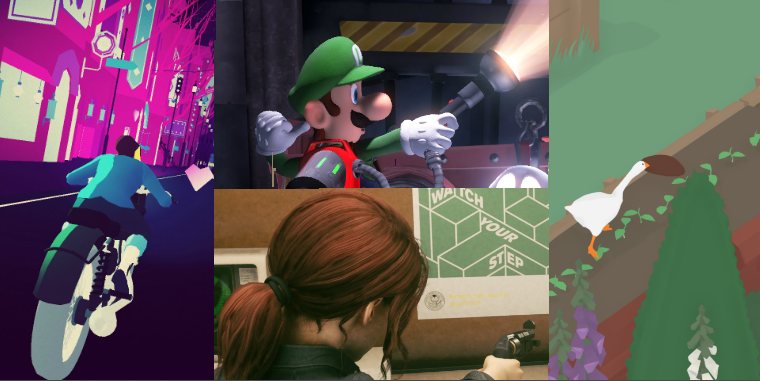
Today's gamer is faced with an embarrassment of riches when it comes to choices. Every day there are literally dozens of new titles being released across consoles, PCs, mobile phones, VR platforms, and more. Usually that includes at least a couple of games that would be worth your time, if only you had the time to sort through them all.
We can't say we've played through all the thousands of titles big and small that have come out this year. Of the ones we have played, though, these are the ones that we'd feel comfortable recommending to anyone.
20. Telling Lies

Sam Barlow/Annapurna Interactive; Windows, Mac, iOS
The basic story in Telling Lies wouldn't be all that interesting if it was told as a standard, linear movie plot. But Sam Barlow's follow-up to 2015's excellent Her Story once again proves that the storytelling function can grow out of a newly relevant interactive form.Players experience the narrative of Telling Lies via one-sided pieces of two-way video conversations, accessed via semi-random searches through a hard drive database. There's an immense intimacy to experiencing a story like this, via characters talking directly to the camera, to you. You see these people utterly exposed, interacting with unseen partners, reacting to unheard provocations, and pausing to listen to long-unheard monologues, with no knowledge that someone else will be spying on them much later. Getting to know these people in this way almost feels intrusive, like you're intruding on private moments that might better remain hidden.
There's a certain puzzle-sorting joy in piecing together the larger plot from these disjointed conversations, and every newly discovered clip has the potential to serve as a "twist" that recontextualizes information from the past (or the future, depending on the order in which you view it all). While the conclusion feels a little cliche and not entirely earned, the strong acting and tightly written characterization keeps it all engaging until the very last clip is discovered. We can only hope Barlow's work inspires others to keep experimenting with what is still a largely unexplored storytelling format.
-Kyle Orland
19. Remnant: From the Ashes
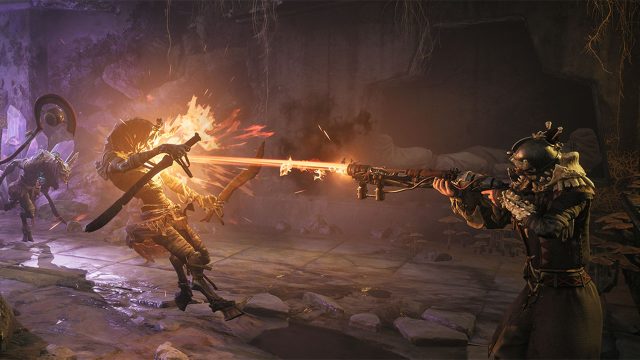
Gunfire Games; Windows, PS4, Xbox One
More Destiny? Meh. More Borderlands? Nah. Give us more Remnant: From the Ashes.
This modest third-person combat game takes all of the lessons a development team could possibly learn from Destiny 2, Monster Hunter, and Dark Souls, then funnels them together into a co-op combat experience that I keep returning to with my favorite online battling buddies. There's a real grace to Remnant's semi-randomized combat onslaught. You'll march through a randomly generated town instance one moment, picking through its every corner for useful loot while contending with surprise-spawn enemies, then find a door that warps you to either a randomized or pre-made instance of more intense foes (or even one of its many incredible boss battles).
After every particularly brutal battle, the game is wise enough to drop an accordion-squeeze cool-down of traversal and simpler combat before ramping things up again. And at any point, it's easy for a trio of friends to warp to a base and unpack a mix of weapon purchases and plot reveals in ways that should particularly embarrass the devs who famously bungled the very same thing in Anthem.
This basic formula, which constantly keeps a group of friends exploring and fighting without any aimless wandering through open worlds, is anchored by a tremendous mix and balance of ammo-limited firearms and brutal-and-slow, Souls-like melee implements. Remnant is generous enough to let players customize their loadouts to specialize in either gunplay or swordsmanship, but you won't get far without juggling each weapon extreme. Plus, it's easy enough for friends to bring on a random partner or newbie thanks to intelligently scaling combat, so it's that much easier to party up and play Remnant in its ideal, three-fighter state at any given moment.
-Sam Machkovech
18. Super Mario Maker 2
Nintendo; Switch
Judged purely as a sequel, Super Mario Maker 2 is a bit hit or miss. New course-building options, on/off switches, and an entire "3D World" game style are transformative, but other additions like the Angry Sun and Koopa Car feel a bit too basic for their own good.But the specifics of Mario Maker 2's additions are almost beside the point. Here, once again, is a game that takes the time-tested platforming core of the Mario series and extends it into a functionally infinite playspace, where you'll never run out of new levels to play. Yes, finding actual good levels is a bit harder than one might like, but it's made a bit easier in this sequel with new tagging and description options, as well as a new option for players to "Boo!" the worst levels so they're less likely to pop up in random sorting.
Super Mario Maker was always too good of a concept to be trapped on a failed platform with a dwindling player base like the Wii U. On the Switch, the idea is finally getting the player attention (and full portability) that it deserves. And Nintendo is already offering free DLC updates, including an inventive new "Zelda maker" sub-mode, that will hopefully presage long-lived support for even more new building and playing options in the future.
-Kyle Orland
17. Mortal Kombat 11
NetherRealm Studios; Windows, PS4, Xbox One, Switch, Stadia
As a big fan of fighting games it's always nice to see the genre appear on these year-end lists. Last year I wrote about Dragon Ball Fighterz, and this year the honor goes to Mortal Kombat 11. I hope there's another fighter next year good enough to make the cut.Mortal Kombat 11's story mode is polished and reeks of high-budget CGI and is compelling even with some cheesy voice acting. There's still a little awkward jank to the animations, but the modeling and lighting and overall look of the game really is stunning and full of atmosphere. After a few rocky launch issues, there's a good amount of compelling single-player content if you're just looking to play solo without couch co-op, and more importantly, if you are feeling competitive the rollback netcode is absolutely excellent. The post-launch DLC characters have been well designed (with perhaps the exception of odd guest character The Terminator, who feels a little out of place and features some particularly questionable animations even by the standards of the game and robotic movements).
Overall it has been a really solid package that keeps delivering more content and value for fans. So why do I sound a bit hesitant in lauding the game? The truth is it's just too damn bloody. I addressed the excessive amounts of gore in my review, and since then I've only felt worse about it. Repeated viewing of the gory fatalities and "krushing blows" hasn't desensitized me to the violence. Instead I find myself more turned off than before. The animators at Netherrealm Studios reportedly suffered PTSD from all the time researching and animating out the detailed guts and viscera, and frankly I'm not surprised.
MK11 showed that modern fighting games don't have to be niche, that they can move big units and still be massively popular outside of hardcore circles. NRS put an enormous amount of polish into the game, and it has proven to be well constructed from a mechanical and competitive standpoint. But I have trouble recommending it without the big caveat that you really gotta be all in for realistic sprays of blood, brain, and intestines if you're going to play it. Otherwise maybe wait to see what next year brings. Maybe I'll be back to laud Guilty Gear Strive, which is already looking gorgeous and, thankfully, gore-free.
-Aurich Lawson
16. Metro Exodus
4A Games; Windows, PS4, Xbox One, Stadia
Having played, and liked, previous Metro games, we knew the Polish design team at 4A Games could successfully marry the linear-campaign ethos of Half-Life with author Dmitry Glukhovsky's grungy, post-nuclear universe. Where Metro Exodus blew us away was its ability to marry that narrative-driven campaign philosophy with a series of wide-open landscapes in ways that funneled players' attention to the important bits while also leaving them open to explore or take risks outside the beaten path.As much as Far Cry reimagined open-world combat over the past decade, that series has devolved into a bloated collect-a-thon (this year's Rage 2 fell down the same unfocused rabbit hole of general design). Metro Exodus' brilliance doesn't require constant comparisons to other open-world shooters, but its organic arrangement of missions and tasks, and its ability to drop interesting storytelling in its worlds' corners without feeling like a constant copy-paste of generic buildings and other assets, sure looks all the more impressive when you see other first-person campaigns fail to compare. This is exactly the kind of single-player game we bellyache for in comment threads about annoying, always-online shooters: a game that respects our intelligence and time in giving us a challenging, compelling, and character-filled drama that requires shooting our way through beautifully horrific monsters to survive.
-Sam Machkovech
15. Tetris 99
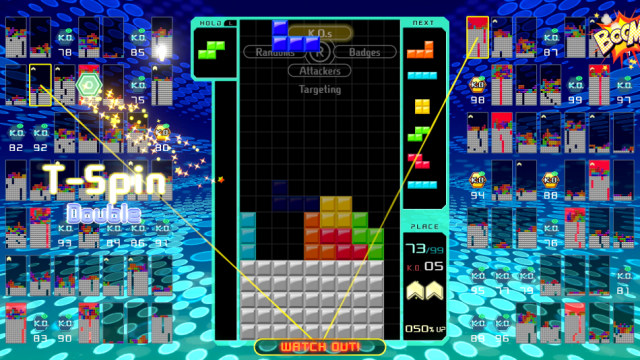
Arika; Switch
Really, The Tetris Company could just re-release a new version of plain-old Tetris every year and it would probably earn a spot on our "game of the year" list each time. The core concept of sorting tetriminoes into gap-free lines is just that good. But Tetris 99 takes that core gameplay and sprinkles in a healthy helping of "Battle Royale" competition with 98 strangers to great effect.At first glance it all seems a bit like a kind of light parallel play, with "garbage block" incursions from other players filling in at the bottom of your playfield with a seemingly random caprice. But then you plunge into the game's hidden strategic depths, learning about the targeting and badge systems that dictate the subtle risk-reward interplay between aggression and defense. Every new match builds on the Tetris skills you've likely already built up over a lifetime while also splitting your attention ten different ways between a host of threats and opportunities to reach that top spot.
The only real problem with Tetris 99 is that the game's current player pool is tilted toward obsessive experts who can be somewhat discouraging to casual players. If you're willing to put in the effort to complete levels, though, Tetris 99 is probably the most intense multiplayer take on a gaming classic we've yet seen.
-Kyle Orland
14. Dicey Dungeons
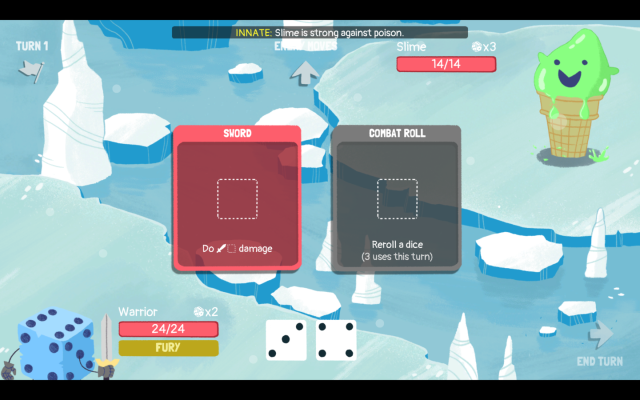
Terry Kavanaugh; Windows, Mac, Linux, iOS, Android, Switch
Dicey Dungeons bills itself as a “deckbuilding roguelike,” and though you’re playing with dice instead of cards, the general pace of the game will be familiar to fans of Slay the Spire and its card-grabbing ilk. Instead of building a deck of cards, you’re collecting equipment that you trigger by assigning the dice you roll each round. You start out with weak, uninspiring gear, but as you make your way through a run, you can grab and upgrade new abilities. In true roguelike fashion, you must make your way through a random gauntlet of enemies to reach the final boss. Die, and you have to start over.Equipment requires certain combinations of numbers to be triggered—”Toxic Ooze,” for instance, deals damage equal to the number of pips on the die you assign to it, but if that number is a six, you also put a couple stacks of poison on the enemy. Some abilities require an even or odd pip-value; others might require a value in a particular spread of numbers (“less than 5” or “at least 3”). The trick is putting together a loadout that maximizes your chances of being able to effectively use every die you roll, no matter the spread.
The game’s six characters play completely differently from one another, not only providing unique equipment choices but also entirely new mechanics that make each one a wildly varied experience. Need even more variability? The game’s “episodes”—six for each character—shake up the rules and win conditions even further. There’s a ton of semi-randomized scenarios to get through here.
Developer Terry Kavanaugh (VVVVVV, Super Hexagon) is known for his compulsively playable games, and Dicey Dungeons is the best of the bunch.
-Aaron Zimmerman
13. Grindstone
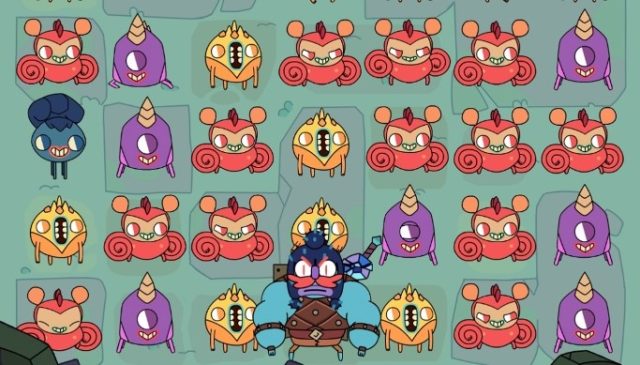
Capybara Games; iOS/Apple Arcade
My $5/month Apple Arcade subscription includes access to dozens of games, but there's only one I keep coming back to when I want a mind-clearing break from the trials of the day. While color-matching games are literally a dime-a-dozen on mobile devices these days, Grindstone is the most absorbing and compelling take on the concept I've yet seen.
There's something endlessly satisfying about looking at a field of colored monsters and tracing out the maximal single path through a single color, then unleashing a screen-clearing melee that hacks them to bits in the best over-the-top '80s cartoon style. It's simple at first, but as color-changing gems rain down and moving boss enemies encroach on the space, planning out your next move becomes a consuming battle of tactics.
As the game goes on and levels become more intricate, there's also another level of strategy involved in the carnage. Do you stick around a level as long as possible to farm the resources you need to power new monster-killing items? Or do you head for the exit as soon as possible, avoiding the increasingly enraged monsters that can corner you and erase dozens of minutes of hard work?
Grindstone might not be the deepest or most complex title on this list, but it stands out as a high-water mark for the genre and an addictive and welcoming respite.
-Kyle Orland
12. Hypnospace Outlaw

Tendershoot; Windows
No game on this year's list is more bizarre, let alone more controversial in being called a "game." More accurately, it's a late '90s world-wide-web simulator, albeit one where you advance the plot by activating a "security" overlay over the fictional sites you browse.
But there's a key difference in Hypnospace Outlaw's version of the '90s information superhighway, Instead of fiber-optic cable connecting the world, the "HynpnOS" service is a universal connection of everyone's subconscious when they drift into sleep. There, people can build, share, and browse Web sites as they sleep, albeit with the caveat that HypnoCorp is always watching. It doesn't take long for the game to blur the line between people's intimate stories and the pitfalls of a surveillance state.
How the heck does this play out as a game? Imagine a classic mystery-adventure point-and-click series like Carmen Sandiego. Then dunk that archetype into a toxic vat of X-Files goo, and add incredible production values in terms of reams of stories and hours of multimedia to be uncovered with your careful browsing.
Anyone who cut their teeth on the '90s version of the Internet, in which image embedding and sharing became standard practice over brutally slow dial-up speeds, will likely adore Hypnospace Outlaw's formula. It reminds you what hell it used to be to search for reliable information and what a delight it was to stumble upon new, weird, and refreshing content in the Wild-West era of Geocities and AltaVista.
-Sam Machkovech
11. Baba Is You
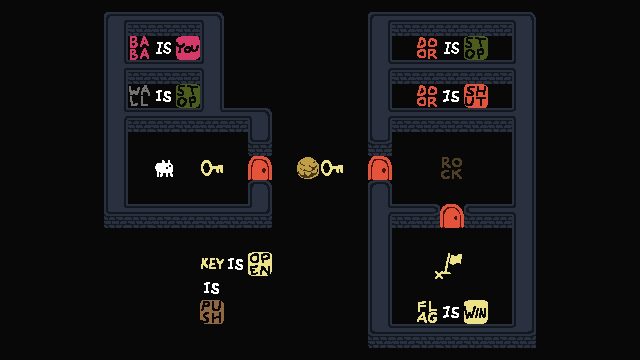
Hempuli; Windows, Mac, Linux, Switch
Gaming is all about verbs, when you get down to it. A description of a game is inevitably a description of what you can do in it. Baba Is You stands out for focusing on a verb that doesn't get a lot of attention in other games: "Is" (or the third person singular present of "be," if you want to get technical).
There doesn't seem to be much to it at first. Your little Baba character can push word blocks around to change the rules of the world. Can't reach the goal flag on the other side of the wall? Just push the word blocks until "WALL IS STOP" becomes just "WALL IS," then walk on through with ease.
Incredibly quickly, though, the game twists this concept every which way to create some truly mind-bending puzzles. Careful manipulation of noun and adjective blocks can lead to floating rivers, multiple Baba clones, automated flaming robots that move when you move, and countless other combinations that all operate on their own intrinsic (and sometimes wild) logic.
After the first few levels, the correct solution to a Baba Is You puzzle is rarely readily apparent at a glance. Figuring out the way forward requires endless tinkering and outside-the-box thinking about new ways to put its simple puzzle pieces together. These are the kinds of puzzles that will have you bashing your head against the wall for hours until something just clicks and you finally see the new successful strategy that has been staring you in the face the entire time.
As with the best puzzle games, Baba Is You's simple rule set lends itself to endless clever possibilities.
-Kyle Orland
10. Neo Cab
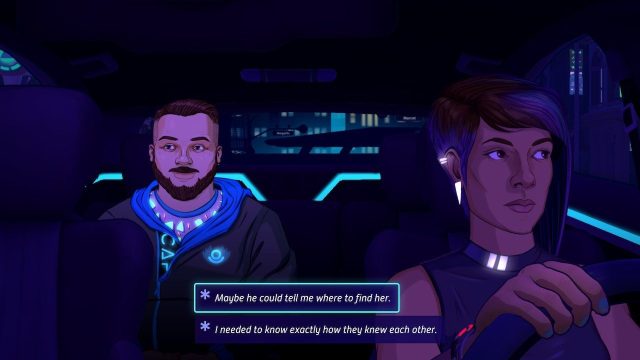
Chance Agency; Windows, Mac, iOS/Apple Arcade, Switch
Neo Cab is less like arcade classic Crazy Taxi and more like "Emotional Conversation Taxi." Though the game swims in incredible atmosphere and hinges on a cool premise—you're a gig-economy taxi driver in a dystopian future, determined to uncover a mystery—this isn't a steering-wheel drive through busy streets. Instead, it's one of the most unique and self-assured games of 2019, but with a niche appeal that is worth minding.A big reason this game cracked our general list, as opposed to other remarkable "visual novel"-styled fare like Eliza, is because its dialogue trees are equal parts advanced and impactful. You spend the entire game picking through conversational options, but your success hinges on minding the emotions of all characters. You're a taxi driver, after all. You gotta read the room before yammering. And the game's mix of writing, mystery, varied cast, and emotional conveyance in characters' faces make this a lot more interesting to do than you might pessimistically assume.
Crucially, this game scales quite well to smartphones, which makes its inclusion in the $5/mo Apple Arcade service a particular boon. We strongly recommend trying this game if it doesn't sound like your usual cup of tea, should you already be interested in the other critically acclaimed Apple Arcade fare out there. I think you'll be pleasantly surprised by the idea of faking like a near-future taxi driver in cahoots with an anti-automation labor revolution.
-Sam Machkovech
9. Luigi's Mansion 3
-
The Poltergust 5,000 returns. It's a combination vacuum cleaner and flashlight. Plus some new tricks this time around.Nintendo
-
After vacuuming up an evil ghost, tap the A button repeatedly to whack it all over the room you're in.
-
Many of the objects you find in a given hotel room or lobby can be sucked up.
-
Turning toilet paper into hard cash.
-
The new plunger attachment for your Poltergust 5,000 lets you attach a single plunger to certain objects...
-
...then suck up its loose cord to grab on and yank or throw the object in question. But this heavy couch might need more than one person.
-
Any ghosts in this pocket? No? Let's check the next one.
-
Sadly, the controls cannot be remapped, in spite of many functions being attached to multiple buttons.
-
Your handy pocket computer includes a map to let you check which rooms you've already explored.
-
Completing in-game "achievements" doesn't lead to rewards—just a sense of accomplishment.
Nintendo; Switch
Luigi's Mansion 3 is arguably the most "Nintendo" game I've seen from the company in years: one that oozes a sense of playfulness in every direction, from how you interact with its spooky environs to how its aesthetics rival the world's best kid-friendly CGI films.The game's busy-yet-pleasant juggle of abilities has increased substantially compared to other games in the series, and that boosted Luigi-ness is a big part of why I hold the game in such high esteem. Think of a classic adventure game from the Lucasarts '80s and '90s fold (like, ya know, Maniac Mansion), and then think of the list of verbs beneath the game image, always available so that players can juggle a decent spread of puzzle possibilities at every step. By going in a similar direction, each new room in Luigi's Mansion 3 feels less rote, less predictable.
The result is the Nintendo game I've been dreaming of since I was an '80s kid hooked on an NES: one where a robust physics system opens wide the game's potential of wacky destruction and a-ha puzzle solutions, and where the childlike sense that Luigi is real, and my possible buddy, is sold by his endless, glee-filled animations (which live and breathe in grounded, realistic-yet-cinematic lighting systems).
-Sam Machkovech
8. Wattam
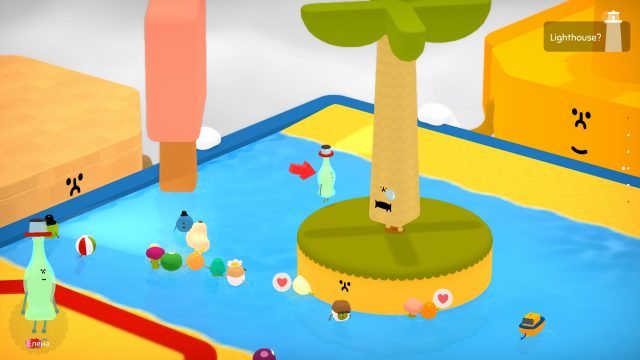
A late addition to this list, Wattam barely snuck in under the 2019 wire with its December release. That comes after six long years of development that saw creator Keita Takahashi (Katamari Damacy) change publisher and game engine as he struggled to realize his vision.
The result of all that work is a singularly silly and hard-to-describe experience. Ostensibly a game about restoring missing objects to a suddenly empty world, Wattam is also a game where ambulatory mouths can transform everything they see into walking poop, and hidden bombs inside hats can send objects flying in a joyful glide. This is a game where giant, golden walking bowling pins interact with toilets and coffee mugs and balloons and apples, and yet it all somehow makes sense.
Underneath all the silliness, though, is a gentle but sweet message about the need to work together in the face of calamity and the importance of "human" connection even in a world where nothing is recognizably human. Through a tight few hours of storytelling, Wattam gets this message across more directly and effectively than dozens of plodding hours of Death Stranding's sci-fi complications. Plus it does so in a way that you can play while laughing your head off with a nearby five-year-old.
-Kyle Orland
7. Outer Wilds
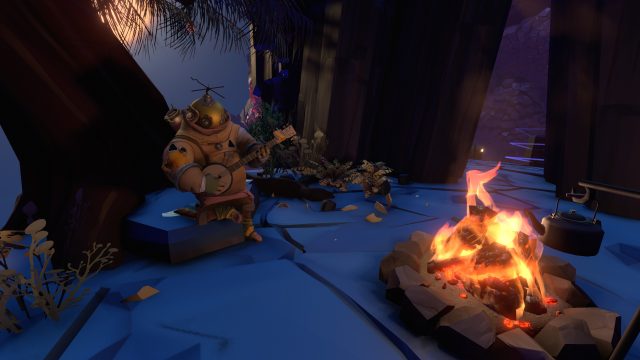
Mobius Digital; PS4, Xbox One, Windows
Yes, we put both Outer Wilds and The Outer Worlds on the same Game of the Year list, which shouldn't help with the problem of everyone constantly mixing these similar game names up. But once you've played Outer Wilds (whose name was settled all the way back in 2012 as a USC student project), you'll never mix the two up again.Where The Outer Worlds retreads familiar Fallout territory in polished fashion, Outer Wilds sends players to the depths of a mysterious universe in much less linear fashion. You have a spaceship, equipped with a sensational 360-degree navigation system. You have a jetpack, which you'll need to carefully pilot as you land on a variety of planets and locales, each with their own gravitational pull. And you have an analysis tool that uncovers secrets in any direction of your friendly neighborhood solar system. Really: stand on your home planet, aim all around the universe, and you'll hear strange signals so long as you accurately point in their direction as the crow flies. The catch being, of course, that a direct flight path is never enough in Outer Wilds.
Also, you have a finite end constantly breathing down your neck: a cataclysm that repeats every 22 minutes of real time. That may sound familiar to fans of Majora's Mask, but Outer Wilds treats its timeline conceit differently enough to stand out (and doesn't lead to frustrating repeat-tasks-over situations, since the game keeps track of your general progress as time resets). The game's weirdest mysteries blend neatly into your journey to understand why the universe seems to be ending, and Outer Wilds is careful not to grip players' hands too tightly in letting its stories and histories unravel in fascinating fashion.
All of this plays out without rote combat, yet the discovery and space-flight efforts you'll undertake are exciting enough to be worth dropping a blaster or swords in favor of. Really, no other video game on this list feels more "Ars"-y than Outer Wilds, with a style that combines Stanley Kubrick, Jim Henson, and a bewilderingly open-ended approach to world design that reminds us of classic PC franchises like Zork and Ultima.
-Sam Machkovech
6. Sayonara Wild Hearts
Simogo; iOS/Apple Arcade
Judged purely on its gameplay, Sayonara Wild Hearts might not deserve a spot on this list. The rhythmic movement and beat-matching often feels a bit too squishy (especially using touch-screen controls), and timing beats are often presented without enough on-screen warning to react in time.None of that lessens what an all-consuming, memorable, and altogether original gaming experience Sayonara Wild Hearts is, though. The developers have described it as an interactive music video, and that's a largely accurate take. But it often feels like a music video from an alternate and much more psychedelic timeline where abstract art, anime, and '80s cartoons combine as major influences driving a new art form.
There's a dream-like quality to Sayonara Wild Hearts' non-stop movement through insanely varied settings and situations that's only aided by the game's ethereal beats, swirling colors, and over-the-top character designs. By the end of the ride, you're left with a vague, otherworldly feeling more than a concrete, easy-to-digest explanation of what you just experienced. The worst part of Sayonara Wild Hearts may be how quickly the whole thing is over and the fact that there's nothing else quite like it to occupy your time after you're done.
-Kyle Orland
5. The Outer Worlds
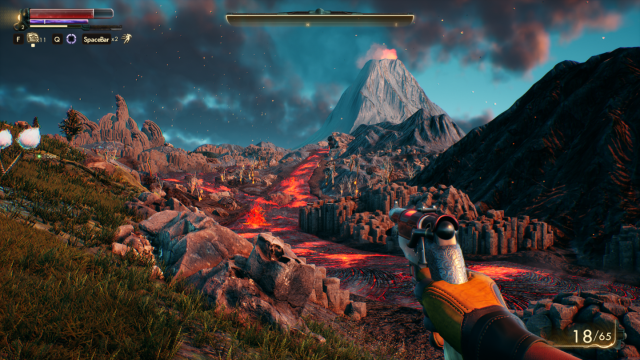
Obsidian; Windows, PS4, Xbox One, Switch
Opinions diverged pretty wildly at Ars when it came to 2014's Fallout 4, enough so that it didn't crack that year's best-games list. Five years later, much of the same Ars braintrust is still here, and its members have reached a greater consensus this time around: The Outer Worlds, and its shameless mining of the best in classic Fallout games, is a no-brainer pick as a top game in 2019.Obsidian Entertainment primarily wins by crafting a story where every major character exists in a tantalizing, gray-area cloud of good intentions and broken souls. That matters in a game where you can expect a reward for either helping or killing anyone you meet—and be paid off in experience points at the least, or compelling new quests at the most, for taking gameplay risks. Everyone you encounter needs to matter and also simultaneously be disposable. They are also often funny, or weird, or otherwise memorable in the process. Uh, how many characters does this game have, again? Quite a freaking few, and that's not even talking about your five omnipresent companion allies, of which two tag along at any given moment—and offer their own unique dialogue and quest possibilities. They're not just fun to talk with, they also shoot stuff up real nice.
Combat has admittedly been tuned too far in the direction of simplicity, but as a direct descendant of Fallout, that's somewhat fitting. We'll take this game's competent selection of guns, satisfying time-dilation moves, and your allies' own violent special abilities, to boot. That's all been combined with a focused, back-to-the-roots take on Fallout-style adventuring, free of the bolted-on complications (particularly settlements) that made Fallout 4 a more controversial release five years ago. It's still complex where it counts in terms of story and rapidly changing allegiances. We'll take it.
-Sam Machkovech
4. Untitled Goose Game
-
The goose didn't caption these images, so they're a bit more informative about what this actually is: a video game about being a goose. (Thanks for being good sports about us having a goose review its own game.)
-
Once you tap the game's dedicated "honk" button, your goose emerges and waddles through a brief tutorial.
-
You don't simply bend forward to get past weird terrain.
-
That posture is also imperative when either plucking items high or low.
-
And you'll need to use both stances to get this door open.
-
It's easier to goose around using a gamepad. Thank goodness for a dedicated "honk" button.
-
Yes, the dedicated "spread your wings" button is (mostly) for show.
-
Though the game opens with a giant pond, you mostly wander around on land.
-
How do we get this farm's door open? Simple: pull one bag of fertilizer down in order to reach the radio on top. Then tap the radio to turn on its music. The farmer will run out and shut the radio off, at which point you can sneak into his garden.
-
BROOM! ACK! HONK!
-
Getting into this shop and getting your goose's face on TV is one of this "level's" required tasks.
-
You've helped create some confusion between the child and the market owner.
-
Hmm. We can't reach that handle from this side. Eventually, you'll reach the other side, at which point you can more easily return to various zones of goose silliness.
House House; Windows, Mac, PS4, Xbox One, Switch
The most striking thing about Untitled Goose Game, when all is said and done, might be how funny it is.Sure, there have been games that have made attempts at humor before, and some have even succeeded. But most of those games ape the forms of TV and movies for their humor, relying on clever writing or wacky characters to get chuckles out of dialogue-filled cut scenes. What makes Untitled Goose Game really stand out is how many completely hilarious situations arise from the actual gameplay and animations without a single spoken word.
It can be something as simple as a well-timed honk that knocks a character over at the perfectly timed moment, or a proper gentleman running after a stolen slipper, or the way the goose can play a beak-held harmonica by honking. It's the kind of slapstick humor that hits on the ridiculous and the sublime at the same time, grounded in real-world situations and simple controls that are instantly accessible to practically anyone with a passing familiarity with video games.
Untitled Goose Game is the kind of game that makes you look at the world differently. Specifically, it's the kind of game that makes you ask "What would happen if there was a particularly jerky goose in this situation" at random points throughout the day. You can't say that about many other games.
-Kyle Orland
3. Apex Legends
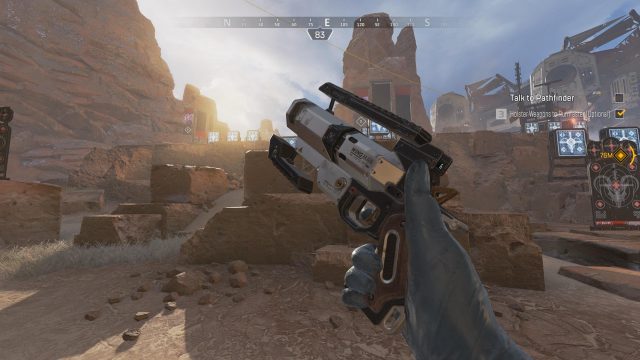
Respawn Entertainment; PS4, Xbox One, PC
Apex Legends is pretty much exactly what it looks like: another battle royale game in the vein of Fortnite and PUBG mixed with the character shooter elements of Overwatch. But if the tech industry at large has taught us anything over the years, it’s that there is plenty of value to be found in a well-executed rip-off.What Apex lacks in creative ambition, it makes up for in Destiny-level responsiveness, consistent internal logic, and common-sense quality-of-life improvements to the battle royale formula. Its primary verbs—run, slide, shoot, jump—feel as satisfying as you’d expect from the guys who created Call of Duty and Titanfall (and satisfaction is the point here). All battle royale games should forever copy its ping system, which genuinely facilitates communication without forcing you to talk to weirdos online when you aren’t in the mood.
It still features the things any good battle royale does: every improvisation you make in a round stems from that initial drop; it encourages forward thinking and risk assessment more than wanton combat; every gun, attachment, and special ability has its own character and impact on the way you play; there's the shared understanding of values within the player base and of the importance of listening. It’ll still get your heart pumping when the end is near. There’s little groundbreaking about Apex, but there’s plenty refined. Just ignore the price of character skins.
-Jeff Dunn
2. Disco Elysium
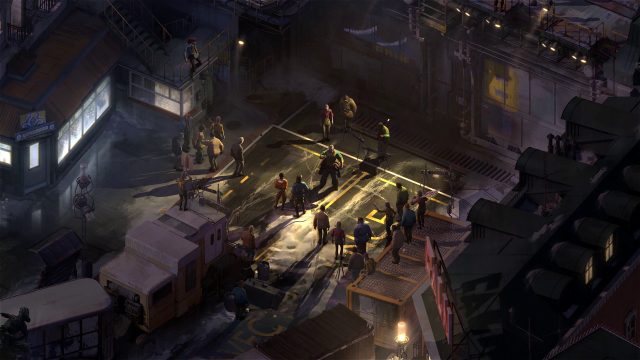
ZA/UM; Windows, PS4, Xbox One
The best character in a video game this year is one I nurtured into being: a washed-up alcoholic detective with strong communist sensibilities and a penchant for talking about the uncaring void with his horrific necktie. Waking one morning with a case of heavy-drinking-induced amnesia, your character in Disco Elysium must glue together the shattered pieces of his psyche while also trying to solve a murder case in a gritty, post-failed-revolution world.Those “pieces of psyche” actually function as upgradable skills—and as characters that pop up in your head to put their two cents in during conversations. Empathy calls attention to emotional cues, while Rhetoric pipes up with arguments you can use against interview subjects. Weirder skills, like Inland Empire, butt in to harass you with David Lynchian anxieties about the strange and unknown. The different parts of your brain help steer you into breakthroughs, but they also argue with each other and very occasionally give less-than-responsible advice (electrochemistry screeches at you constantly to do as many drugs as possible). Idle thoughts can be nurtured into full-blown parts of your personality, making you a “hobo cop,” a suicidal depressive, a staunch nationalist, etc.
There is no combat system; everything is handled through reams of text, dialogue choices, and simple dice-roll checks. The writing is uniformly excellent—easily the most engaging writing we’ve seen in the modern CRPG renaissance—and there’s no “right” way to play. I often worry about making a bad decision or failing an important check in RPGs; Disco Elysium begs you to simply roleplay at all times, and it rewards you with a character that’s all your own. Fail a check and you’ll often find yourself in a different, but equally advantageous, position as if you passed it.
Disco Elysium’s inventive gameplay systems all work together wonderfully, but in a game full of endless words, it's the writing that seals the deal. It’s easily one of the best RPGs in years.
-Aaron Zimmerman
1. Control
-
Those floating bodies? Yeah, they're everywhere. And sometimes they fight back.
-
Telekinesis may not be a real thing, but in Control, it's really fun.
-
When possessed enemies are defeated in Control, they explode in pretty satisfying fashion.
-
More oil-smear effects when enemies go kaboom. Though don't kid yourself; this game is rated M for a reason, primarily thanks to all the dead, scattered bodies around this Federal Bureau of Control (FBC) facility.
-
Jesse has important business to attend to as the newly appointed chief of the FBC.
-
Whenever players enter a new section of the FBC, a dramatic, all-caps logo announces it.
-
A better look at a similarly eerie, glowing-red hallway full of monsters.
-
The FBC's former director somehow talks telepathically to you.
-
Optional video sequences explain some of the FBC's studies and experiments.
-
Or you can watch them on old CRT TVs.
-
Ahti has a lot to say throughout the game. Very rarely does he make sense.
-
At least Jess acknowledges how weird he sounds.
-
This children's series about the effects of supernatural forces is darkly hilarious.
-
C is not for "cookie."
-
Some dramatic sequences end with Jesse removing the "Hiss" effects from everyday objects.
-
I'm always a fan of video game signage that takes fictional catastrophes really seriously.
Remedy; Windows, PS4, Xbox One
Control isn't just the best video game ever made by Remedy Entertainment. It's also everything I want in an action-adventure video game. That begins with a telekinetic control system that makes the game's hero, Jesse, an accessible-yet-powerful badass in terms of laying waste to mobs of eerie enemies. There's a real genius to Control's melting of abilities and energy meter at any given moment, as this forces players to juggle Jesse's range of guns and superpowers in ways that would make any X-Man or Jedi blush.What's more, this enthralling core is smothered with world-building, mysteries, and likable characters every step of the way, whether you restrict yourself to the primary plot or sink your teeth into a surprisingly meaty series of side missions. We knew Remedy could get that stuff right; Alan Wake and Quantum Break are proof that the Finnish studio's game-story mastery wasn't a fluke. But finally, the attached gameplay is back to Max Payne levels of polish.
Admittedly, Control's console performance was trash at launch, but its demanding engine has since received welcome patches so that you don't have to be a PC gamer to lap up a worthy aesthetic experience. PC players still get the best version of the year's best game, should their GPU of choice support DirectX 12 ray tracing. And based on how remarkable that version looks, we might urge you to commit crimes to get your Control-playing PC up to ray tracing snuff.
-Sam Machkovech
https://news.google.com/__i/rss/rd/articles/CBMiSGh0dHBzOi8vYXJzdGVjaG5pY2EuY29tL2dhbWluZy8yMDE5LzEyL2Fycy10ZWNobmljYXMtYmVzdC1nYW1lcy1vZi0yMDE5L9IBTmh0dHBzOi8vYXJzdGVjaG5pY2EuY29tL2dhbWluZy8yMDE5LzEyL2Fycy10ZWNobmljYXMtYmVzdC1nYW1lcy1vZi0yMDE5Lz9hbXA9MQ?oc=5
2019-12-24 13:00:00Z
CBMiSGh0dHBzOi8vYXJzdGVjaG5pY2EuY29tL2dhbWluZy8yMDE5LzEyL2Fycy10ZWNobmljYXMtYmVzdC1nYW1lcy1vZi0yMDE5L9IBTmh0dHBzOi8vYXJzdGVjaG5pY2EuY29tL2dhbWluZy8yMDE5LzEyL2Fycy10ZWNobmljYXMtYmVzdC1nYW1lcy1vZi0yMDE5Lz9hbXA9MQ
Bagikan Berita Ini














0 Response to "Ars Technica’s best games of 2019 - Ars Technica"
Post a Comment